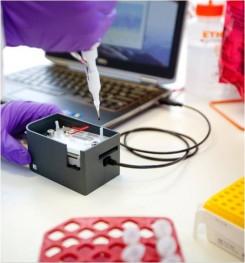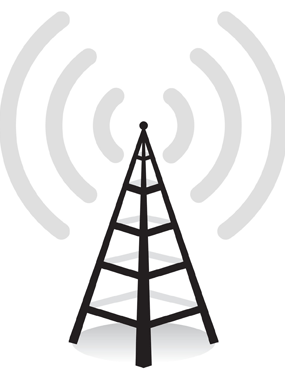 A team of scientists, comprised of software engineers, bioinformaticians, and statisticians, has created a new generation DNA sequencing designed to enable users to run an experiment until sufficient data has been collected to reach a predetermined experimental endpoint. In other words, the sequencing stops when the user finds what they’re looking for. In contrast, other molecular analysis systems have a fixed analysis time, or ‘run time’ that delivers a surged batch of data at the end of that run. In such cases, the user is forced to design the experiment to fit the machine that the analysis is performed on. The system has been miniaturized down to a USB stick. Place your sample on the USB sequencer and plug it into your laptop. With this device, samples can be generated in the field. The system is designed to be compatible with complex samples such as blood or serum and environmental samples such as water samples. Immediate potential applications could include quick DNA analyses of biopsied cells to assess the risk of cancer. These small $900 devices can be sent to people and administered by a local. The data could be sent back via a secure connection. The health tech or environment tech doesn't need to leave the lab, and the sample doesn't need to be sent to the lab. "This is a pivotal moment for both Oxford Nanopore and IP Group," said Alan Aubrey, Chief Executive Officer of IP Group. “The significance of this technology introduction is, in computing terms, analogous to moving from the mainframe to the laptop. Oxford Nanopore's technology platform is truly disruptive and game-changing and is poised to deliver new applications and general benefits to science and medicine. Potential applications including screening genetic material, prenatal screening for genetic defects and diagnostic tests aimed at identifying genetic mutations that have applicability in agricultural, environmental and medical markets."
A team of scientists, comprised of software engineers, bioinformaticians, and statisticians, has created a new generation DNA sequencing designed to enable users to run an experiment until sufficient data has been collected to reach a predetermined experimental endpoint. In other words, the sequencing stops when the user finds what they’re looking for. In contrast, other molecular analysis systems have a fixed analysis time, or ‘run time’ that delivers a surged batch of data at the end of that run. In such cases, the user is forced to design the experiment to fit the machine that the analysis is performed on. The system has been miniaturized down to a USB stick. Place your sample on the USB sequencer and plug it into your laptop. With this device, samples can be generated in the field. The system is designed to be compatible with complex samples such as blood or serum and environmental samples such as water samples. Immediate potential applications could include quick DNA analyses of biopsied cells to assess the risk of cancer. These small $900 devices can be sent to people and administered by a local. The data could be sent back via a secure connection. The health tech or environment tech doesn't need to leave the lab, and the sample doesn't need to be sent to the lab. "This is a pivotal moment for both Oxford Nanopore and IP Group," said Alan Aubrey, Chief Executive Officer of IP Group. “The significance of this technology introduction is, in computing terms, analogous to moving from the mainframe to the laptop. Oxford Nanopore's technology platform is truly disruptive and game-changing and is poised to deliver new applications and general benefits to science and medicine. Potential applications including screening genetic material, prenatal screening for genetic defects and diagnostic tests aimed at identifying genetic mutations that have applicability in agricultural, environmental and medical markets." DNA Sequencing Just Got Cheaper and Faster
 A team of scientists, comprised of software engineers, bioinformaticians, and statisticians, has created a new generation DNA sequencing designed to enable users to run an experiment until sufficient data has been collected to reach a predetermined experimental endpoint. In other words, the sequencing stops when the user finds what they’re looking for. In contrast, other molecular analysis systems have a fixed analysis time, or ‘run time’ that delivers a surged batch of data at the end of that run. In such cases, the user is forced to design the experiment to fit the machine that the analysis is performed on. The system has been miniaturized down to a USB stick. Place your sample on the USB sequencer and plug it into your laptop. With this device, samples can be generated in the field. The system is designed to be compatible with complex samples such as blood or serum and environmental samples such as water samples. Immediate potential applications could include quick DNA analyses of biopsied cells to assess the risk of cancer. These small $900 devices can be sent to people and administered by a local. The data could be sent back via a secure connection. The health tech or environment tech doesn't need to leave the lab, and the sample doesn't need to be sent to the lab. "This is a pivotal moment for both Oxford Nanopore and IP Group," said Alan Aubrey, Chief Executive Officer of IP Group. “The significance of this technology introduction is, in computing terms, analogous to moving from the mainframe to the laptop. Oxford Nanopore's technology platform is truly disruptive and game-changing and is poised to deliver new applications and general benefits to science and medicine. Potential applications including screening genetic material, prenatal screening for genetic defects and diagnostic tests aimed at identifying genetic mutations that have applicability in agricultural, environmental and medical markets."
A team of scientists, comprised of software engineers, bioinformaticians, and statisticians, has created a new generation DNA sequencing designed to enable users to run an experiment until sufficient data has been collected to reach a predetermined experimental endpoint. In other words, the sequencing stops when the user finds what they’re looking for. In contrast, other molecular analysis systems have a fixed analysis time, or ‘run time’ that delivers a surged batch of data at the end of that run. In such cases, the user is forced to design the experiment to fit the machine that the analysis is performed on. The system has been miniaturized down to a USB stick. Place your sample on the USB sequencer and plug it into your laptop. With this device, samples can be generated in the field. The system is designed to be compatible with complex samples such as blood or serum and environmental samples such as water samples. Immediate potential applications could include quick DNA analyses of biopsied cells to assess the risk of cancer. These small $900 devices can be sent to people and administered by a local. The data could be sent back via a secure connection. The health tech or environment tech doesn't need to leave the lab, and the sample doesn't need to be sent to the lab. "This is a pivotal moment for both Oxford Nanopore and IP Group," said Alan Aubrey, Chief Executive Officer of IP Group. “The significance of this technology introduction is, in computing terms, analogous to moving from the mainframe to the laptop. Oxford Nanopore's technology platform is truly disruptive and game-changing and is poised to deliver new applications and general benefits to science and medicine. Potential applications including screening genetic material, prenatal screening for genetic defects and diagnostic tests aimed at identifying genetic mutations that have applicability in agricultural, environmental and medical markets." 


